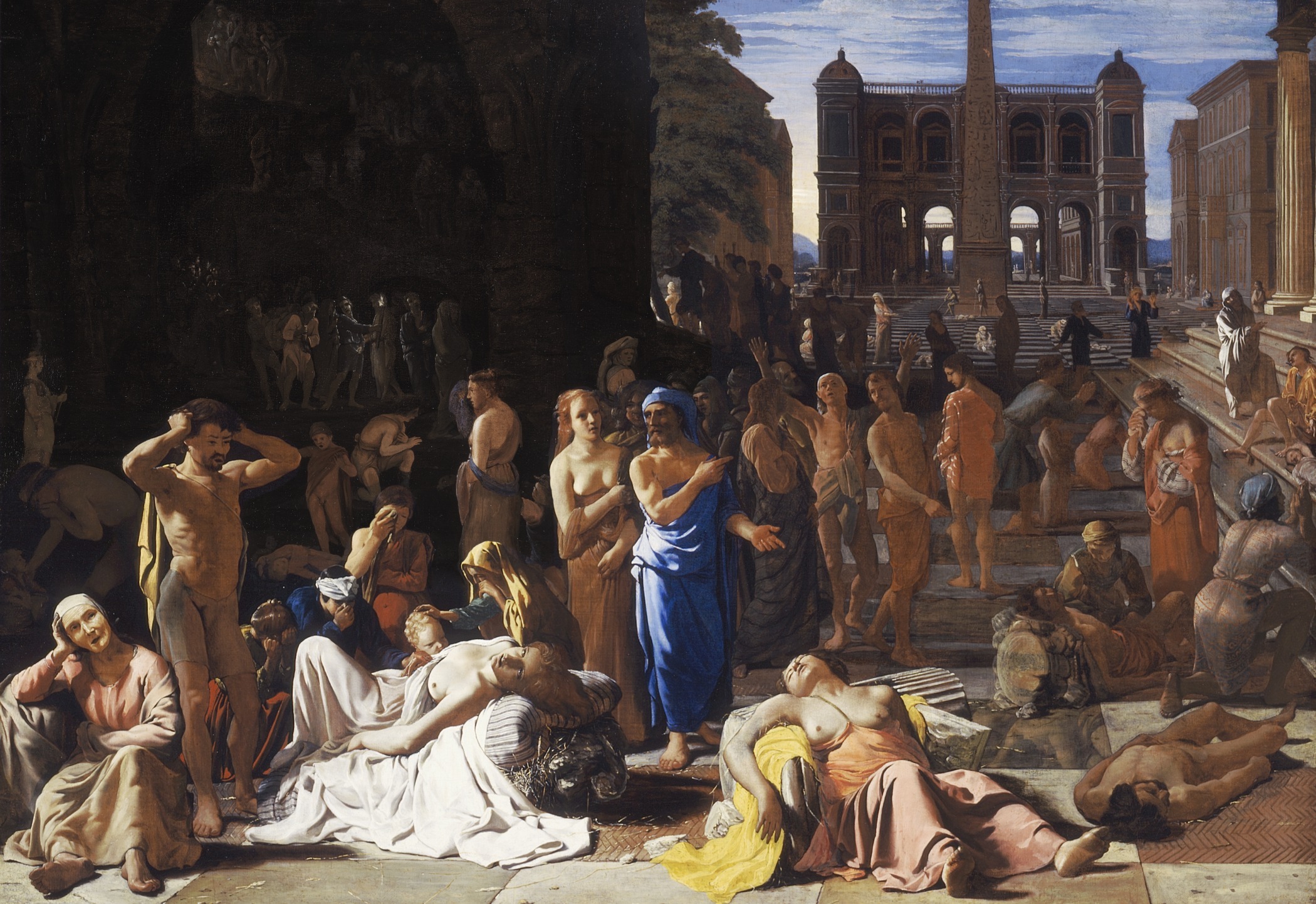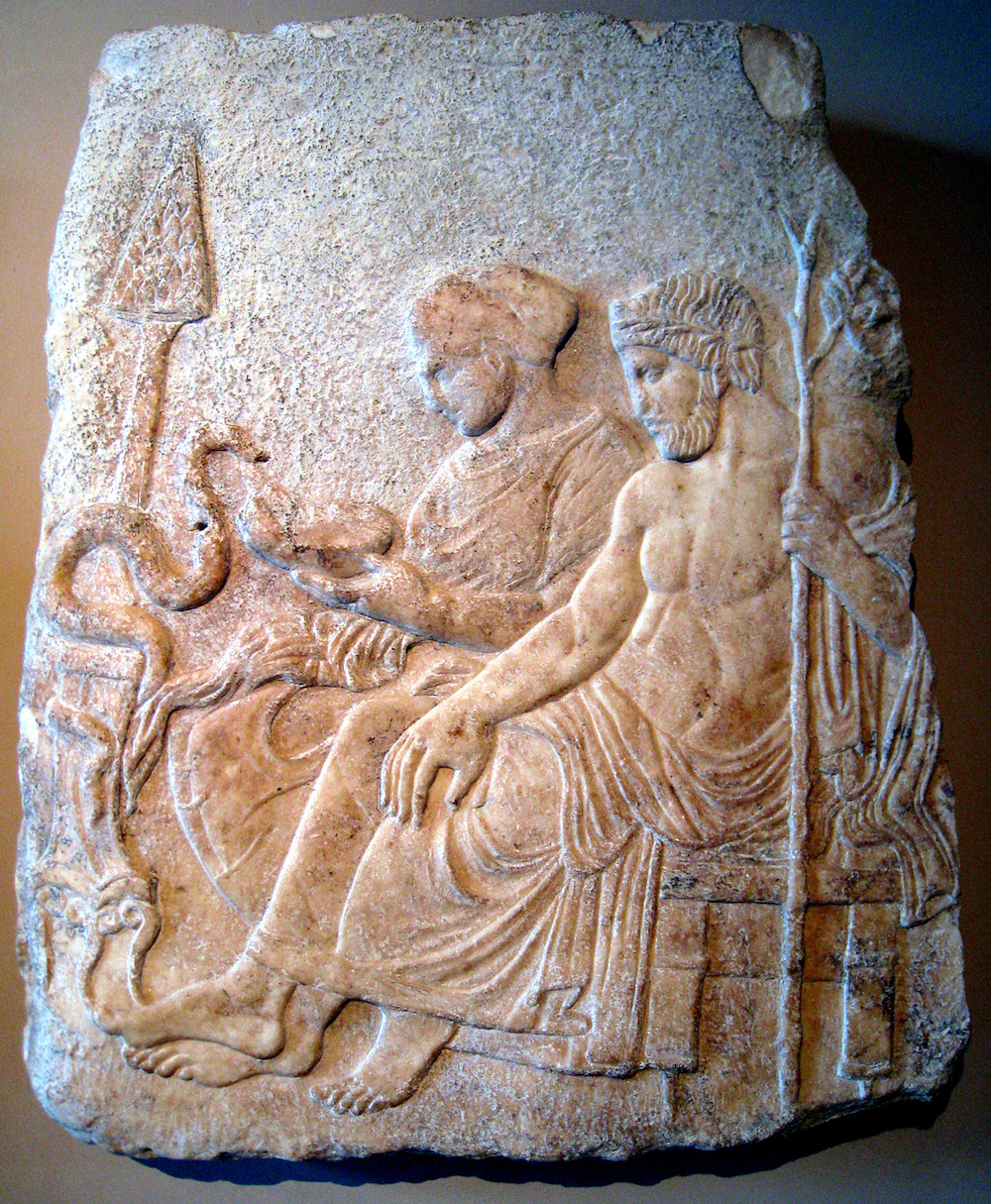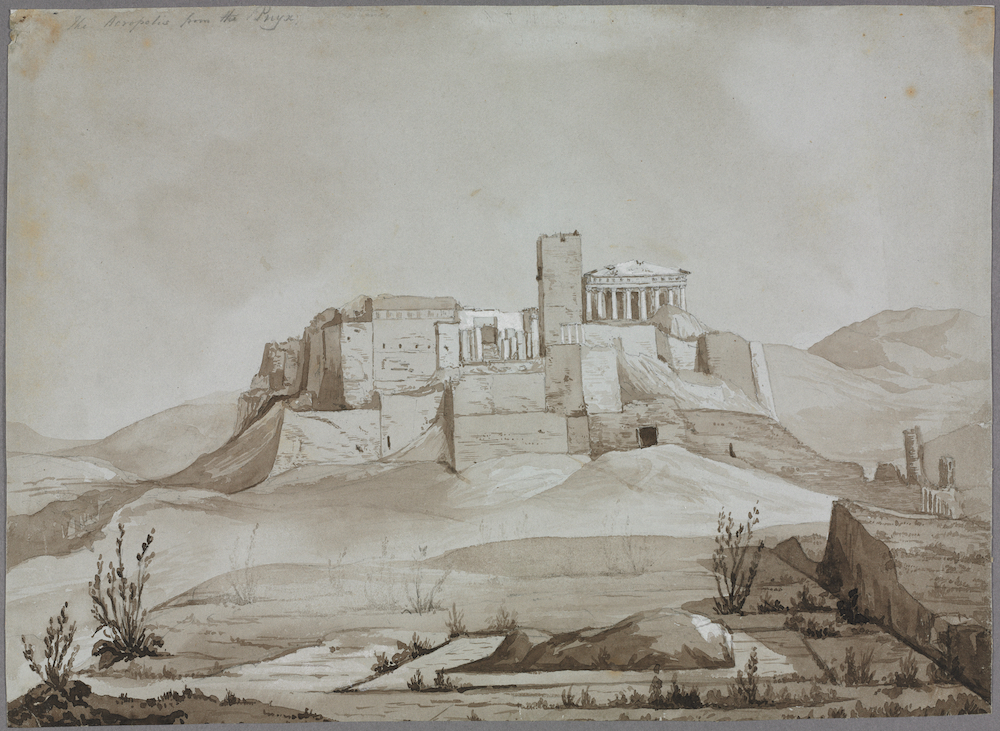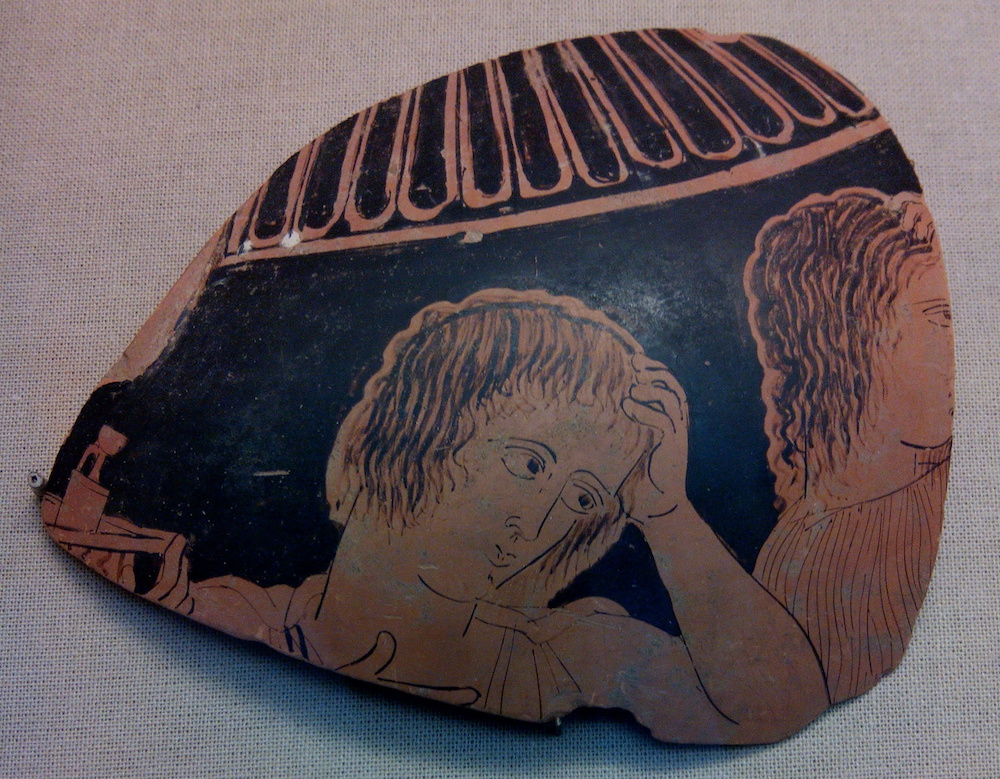
Plague in an Ancient City, by Michael Sweerts, c. 1650. Los Angeles County Museum of Art, Gift of the Ahmanson Foundation.
In the weeks ahead, as the world continues to reckon with and respond to the COVID-19 pandemic, we will feature voices from the past who told stories that rhyme with the one unfolding before us—stories dealing with quarantine, unfathomable deaths, isolation, dread, and attempts to find community when the rest of the world feels far away.
The pestilence that swept through Athens in 430 bc is estimated to have killed up to a hundred thousand people. The people of Athens, in the midst of fighting a war against Sparta, had retreated behind their walls, relying on the power of their superior navy to protect them. But the sudden population increase caused by people from the countryside seeking protection within the city walls taxed resources and hastened the devastating spread of the contagion, which likely entered the city through its only port. As Thucydides relates in his History of the Peloponnesian War:
So great a plague and mortality of men was never remembered to have happened in any place before. For at first neither were the physicians able to cure it through ignorance of what it was but died fastest themselves, as being the men that most approached the sick, nor any other art of man availed whatsoever. All supplications to the gods and inquiries of oracles and whatsoever other means they used of that kind proved all unprofitable; insomuch as subdued with the greatness of the evil, they gave them all over.
In 1995 archaeologist Effie Baziotopoulou-Valavani uncovered a mass grave dated to this period, providing physical evidence to support Thucydides’ account.
Thucydides wrote as an eyewitness—and as a survivor who fell sick himself—and explained the role the plague played in Sparta’s victory in the Peloponnesian War. Lucretius, born nearly 350 years after the outbreak, relates the story of the plague of Athens to support his argument against divine creation and to show that the world is in a constant state of decline and decay. Drawing on Thucydides for his details, Lucretius’ account of the pestilence comes at the very end of his six-volume On the Nature of Things and appears below, adapted from John Selby Watson’s 1851 prose translation. The poem’s abrupt end has led some scholars to speculate that Lucretius died before he could complete it. Scholar Emma Woolerton suggests instead that the ending is a challenge. “We have spent the past 7,500 lines being equipped with all the arguments we need to live a happy life even when looking death and suffering in the face,” she writes. “Finish his poem with a mind that remains focused on the physics and reality of the world, and you know you’ve learnt his lesson.”

A disease and a deadly vapor in the atmosphere once rendered the fields poisonous throughout the territories of Athens; it both dispeopled the roads and exhausted the city of its inhabitants. Having risen in remote parts, proceeding from the coasts of Egypt, and passing through a long tract of air and over the liquid plains of the sea, it at length descended on the people of Pandion, and all were then consigned by troops to disease and death.
They first found the head burning with heat and the eyes red with an extraordinary brilliancy shed over them. The jaws, which looked black within, exuded blood; and the passage of the voice was clogged and obstructed with ulcers. The tongue, the interpreter of the mind, was covered with drops of gore and was enfeebled by the disease, slow in its motion and rough to the touch.
Then, when the pestilential influence, descending through the jaws, had filled the chest and gathered in the suffering stomach of the patients, all the defenses of life at once gave way.
The breath sent forth a fetid odor from the mouth, such as putrid carcasses, cast out upon the earth, emit. The powers of the whole mind and the whole body grew languid, as if on the very threshold of death. On these intolerable sufferings was perpetually attendant an anxious distress of mind and complaints mingled with moanings. A retching, too, frequently occurring both by night and by day, convulsed the nerves from time to time and, contracting the limbs, rendered the sufferers powerless, exhausting those who were already wearied out with pain.
Yet you could not perceive the surface of the body externally inflamed with any extraordinary degree of heat, but rather offering a sensation of gentle warmth to the hand. At the same time, however, all the body looked red with ulcers, as if it were burning in it, as it appears when erysipelas spreads over the limbs. But the internal part of the patient was glowing with heat that penetrated even into the bones; a fire raged in the stomach, as in a furnace, so that you could have rendered no garment, however light and thin, of use to anyone; they constantly exposed their limbs, burning with the disease, to the wind and the cold; and some threw themselves into cool rivers, precipitating their bodies naked into the waters. Many, approaching the brink with open mouths, hurled themselves headlong down into the water in wells; for a parching thirst, raging insatiably, driving them to plunge their bodies into the flood, made vast showers seem only as small drops.
Nor was there any intermission of the malady; the bodies of men lay exhausted; medicine spoke in low tones with a secret dread, so incessantly did the patients roll their eyes, which remained wide-open, burning with disease and unvisited by sleep. Many other signs of death at the same time showed themselves; the mind was distracted with anguish and dread; the brow was gloomy; the look wild and fierce; the ears disturbed and filled with noises; the breathing was either fast, or thick, or drawn but seldom; there was a moist dew of perspiration shining upon the neck; the saliva was thin, scanty, and tinged with the color of saffron; it was also salt and expelled with difficulty from the hoarse throat by coughing. In the hand, the nerves contracted, and the whole arm shook. From the feet a coldness rose quickly, yet gradually, over the body; the nostrils, toward the closing hour of life, were compressed; the point of the nose was sharp; the eyes were hollow; the temples sunk; the skin cold and hard; a distortion overspreading the mouth; the forehead tense and prominent; and, not long after these appearances, the limbs lay stretched in rigid death. For the most part, when the eighth light of the sun shone, or, at farthest, at his ninth rising, they yielded up their life.
If any such sufferers for a time escaped death (as was possible, either by reason of the foul ulcers breaking or by means of a black discharge from the intestines), consumption and destruction awaited him at last. Or, as was often the case, an excessive flux of corrupt blood, attended with violent pains in the head, issued from the obstructed nostrils; and, by this outlet, the whole strength and substance of the man passed away.

He who had escaped this violent flux of foul blood was not certain wholly to recover; for still the disease was ready to pass into his nerves and joints and into the very genial organs of the body. Of those who suffered thus, some, fearing the gates of death, continued to live, though deprived by the steel of the virile part; and some, though without hands and feet, and though they lost their eyes, persisted to remain in life, so strong a dread of death had taken possession of them. Upon some, too, came forgetfulness of all things, so that they knew not even themselves.
And though numerous corpses heaped upon corpses lay extended over the ground, the tribes of birds and of wild beasts either ran off to a distance to avoid the repulsive stench or, after having tasted the flesh, sickened with instant death.
During those days, scarcely any bird appeared in the sky; nor did the destructive tribes of savage beasts leave the woods during the nights. Most of them suffered from the disease and died. The faithful spirit of the dog especially, stretched along all the streets, unwillingly relinquished life; the force of the disease, however, wrested the vital power from his limbs.
Funerals, unattended and solitary, were eagerly hurried over. Nor was there any certain mode of cure common and efficient for all. For that which had secured to one the privilege of breathing the vital air and of beholding the regions of the sky was mere poison to others and hastened their death.
But what was preeminently deplorable and wretched was that when anyone found himself seized with the pestilence, he lay down as if he were condemned to death, sunk in spirit and with a despairing heart, thinking only of death, and gave up the ghost on the same spot on which he fell.
At no time, however, did the contagion of the insatiable disease cease to spread itself from one man to another, as a murrain is disseminated among woolly sheep and horned cattle. And this circumstance even above all others heaped death upon death. On those who had shrunk from visiting their friends fatal neglect soon took vengeance (as having been too fond of life and too apprehensive of death), causing them to perish by a squalid and miserable end, deserted by their relatives and destitute of relief. But those who had been ready to give assistance fell into the malady from infection, because of the duty that shame and the moving entreaties of the sufferers, mingled with sounds of reproach, compelled them to undergo. The most excellent characters, accordingly, incurred this kind of death most frequently.
Those who strove to bury the multitude of their dead, one after another, returned home overcome with weeping and mourning. Hence men were stretched on their beds in great numbers through sorrow and despondency. No one could be found whom, in such a time of calamity, neither disease, nor death, nor mourning, nor the loss of friends, had affected.

As the pestilence now spread, every shepherd and herdsman, as well as every stout driver of the crooked plow, languished under the infection; their bodies lay cooped up within their narrow huts, consigned to death from the effects of want and disease. You might have seen the dead corpses of parents stretched on their dead children, and sometimes children expiring on the bodies of their mothers and fathers.
And this affliction was brought, in no small portion, into the city from the country, an affliction that a sick and infected multitude of rustics, flocking together from all parts, introduced. They crowded all places of reception and of shelter; because they were thus crammed together, death the more easily strewed them in heaps by the force of contagion.
Many bodies, from the effects of thirst, lay stretched at the public conduits, prostrate and extended along the road, their breath having been stopped by too great an indulgence in the deliciousness of water. And everywhere along the open and public roads you might have seen powerless limbs, with half-dead bodies of men, horrible with squalor, covered with rags, and perishing for want of dressing; there was only skin on the bones, which was itself now almost sunk away due to disease of the viscera and overspreading filth.
All the sacred temples of the gods death had now crowded with carcasses; all the shrines of the divinities, in every part, stood filled with corpses; for these were places the attendants of the temples had thronged with strangers. Nor was the worship of the gods or their divinities much regarded; present suffering overcame religious considerations.
Nor was the custom of sepulture, with which pious people had always been accustomed to bury, observed any longer in the city. For the whole people, in perturbation, ran hither and thither; and each in his sorrow buried his friend according to his means.
Dire poverty, too, with sudden impulse prompted men to many impious deeds; for they placed their relatives, with loud outcries, on the funeral pyres raised for others, and applied torches to them, often even quarreling, with great bloodshed, rather than the bodies should be left unconsumed.
Read the other entries in our series: Heinrich Heine, George Eliot, Samuel Pepys, Willa Cather, Thomas Mann, Jack London, John Keats, Alessandro Manzoni, Giovanni Boccaccio, Frances Hodgson Burnett, Daniel Defoe, François Rabelais, and Robert Louis Stevenson.